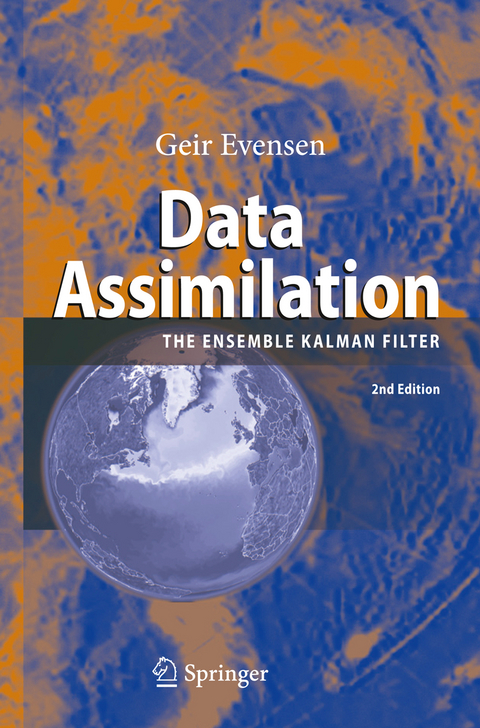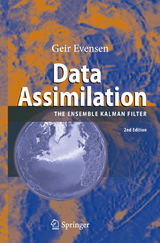Data Assimilation
Springer Berlin (Verlag)
978-3-642-03710-8 (ISBN)
Data Assimilation comprehensively covers data assimilation and inverse methods, including both traditional state estimation and parameter estimation. This text and reference focuses on various popular data assimilation methods, such as weak and strong constraint variational methods and ensemble filters and smoothers. It is demonstrated how the different methods can be derived from a common theoretical basis, as well as how they differ and/or are related to each other, and which properties characterize them, using several examples.
Rather than emphasize a particular discipline such as oceanography or meteorology, it presents the mathematical framework and derivations in a way which is common for any discipline where dynamics is merged with measurements. The mathematics level is modest, although it requires knowledge of basic spatial statistics, Bayesian statistics, and calculus of variations. Readers will also appreciate the introduction to the mathematical methods used and detailed derivations, which should be easy to follow, are given throughout the book. The codes used in several of the data assimilation experiments are available on a web page. In particular, this webpage contains a complete ensemble Kalman filter assimilation system, which forms an ideal starting point for a user who wants to implement the ensemble Kalman filter with his/her own dynamical model.
The focus on ensemble methods, such as the ensemble Kalman filter and smoother, also makes it a solid reference to the derivation, implementation and application of such techniques. Much new material, in particular related to the formulation and solution of combined parameter and state estimation problems and the general properties of the ensemble algorithms, is available here for the first time.
The 2nd edition includes a partial rewrite of Chapters 13 an 14, and the Appendix. In addition, there is a completely new Chapter on "Spurious correlations, localization and inflation", and an updated and improved sampling discussion in Chap 11.
Geir Evensen obtained his Ph.D. in applied mathematics at the University in Bergen in 1992. Thereafter he has worked as a Research Director at the Nansen Environmental and Remote Sensing Center/Mohn-Sverdrup Center, as Prof. II at the Department of Mathematics at the University in Bergen, and as a Principal Engineer at the Hydro Research Center in Bergen. He is author or coauthor of more that 40 refereed publications related to modelling and data assimilation, and he has been the coordinator of international research projects on the development of data assimilation methodologies and systems.
Statistical definitions.- Analysis scheme.- Sequential data assimilation.- Variational inverse problems.- Nonlinear variational inverse problems.- Probabilistic formulation.- Generalized Inverse.- Ensemble methods.- Statistical optimization.- Sampling strategies for the EnKF.- Model errors.- Square Root Analysis schemes.- Rank issues.- Spurious correlations, localization, and inflation.- An ocean prediction system.- Estimation in an oil reservoir simulator.
From the reviews of the second edition:
"This is a well-written and interesting book addressed to students taking an introductory course in data assimilation and inverse methods ... . The material is presented with detail, and calculations are easy to follow. Many figures help the reader to assess the results. Several discussions and comments are provided in each chapter. In this sense, it is written in a pedagogical way. ... a reference book for researchers interested in the interpretation and implementation of advanced ensemble methods." (Jesús Marín-Solano, Mathematical Reviews, Issue 2011 c)
"Data assimilation, as defined by Geir Evensen, refers to the computation of the conditional probability distribution function of the output of a numerical model describing a dynamical process, conditioned by observations. ... the book is subdivided into seventeen chapters, which progressively introduce different aspects of data assimilation with Kalman filters. ... The book primarily addresses researchers in the field of data assimilation, for whom it represents a basic reference text. The text is very carefully written and is intended to be self-contained." (Hans Wackernagel, Mathematical Geosciences, Vol. 42, 2010)
| Erscheint lt. Verlag | 27.8.2009 |
|---|---|
| Zusatzinfo | XXIII, 307 p. |
| Verlagsort | Berlin |
| Sprache | englisch |
| Maße | 155 x 235 mm |
| Gewicht | 698 g |
| Themenwelt | Naturwissenschaften ► Geowissenschaften ► Geologie |
| Schlagworte | Bayesian Statistics • Data Assimilation • Ensemble Kalman Filter • Ensemble Kalman Smoother • Inverse methods • Kalman-Filter • measure • Parameter Estimation |
| ISBN-10 | 3-642-03710-0 / 3642037100 |
| ISBN-13 | 978-3-642-03710-8 / 9783642037108 |
| Zustand | Neuware |
| Haben Sie eine Frage zum Produkt? |
aus dem Bereich




